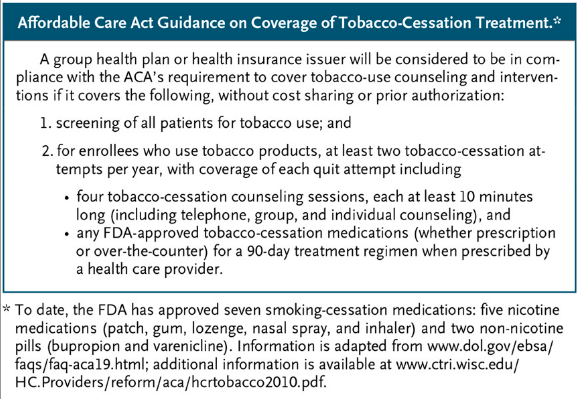Article
Affordable Care Act Aimed to Increase Smoking Cessation
Author(s):
Several provisions of the Affordable Care Act intend to improve smoking cessation rates by increasing insurance coverage for effective interventions.
Several provisions of the Affordable Care Act (ACA) intend to improve smoking cessation rates by increasing insurance coverage for effective interventions, according to a perspective piece published in the New England Journal of Medicine on November 19, 2014.
Tim McAfee, MD, MPH, director of the US Centers for Disease Control and Prevention’s Office on Smoking and Health, and his co-authors pointed out that the ACA requires private health plans to reimburse preventive services granted an A or B grade by the US Preventive Services Task Force, which include tobacco-cessation treatments.
However, the specifics on how insurers should implement cessation coverage mandated by the ACA’s preventive-services provisions were not clearly outlined until the US Departments of Health and Human Services, Labor, and the Treasury jointly released guidance on May 2, 2014, which was based upon 2008 US Public Health Service clinical practice recommendations for treating tobacco dependence.
To comply with that guidance, insurers must cover 2 smoking cessation attempts annually, including tobacco-use counseling sessions and all FDA-approved medications for tobacco cessation. If all health plans fully implemented that broad coverage, it would substantially increase smokers’ quit attempts, treatment use, and, ultimately, tobacco cessation rates, the authors asserted.

“By covering and publicizing the availability of proven cessation treatments, insurers can reduce smoking rates, smoking-related disease, and health care costs,” the authors wrote. “…If the ACA’s tobacco-cessation provisions are fully implemented, they could turn out to be one of its greatest legacies.”
Other ACA provisions that might motivate more smokers to quit involve:
· Applying insurance coverage for certain preventive services with no patient cost sharing to newly eligible Medicaid beneficiaries in states that opt to expand Medicaid.
· Prohibiting states from excluding FDA-approved tobacco-cessation medications from traditional, preexpansion Medicaid coverage.
· Requiring traditional state Medicaid coverage to include tobacco-dependence treatment for pregnant women.
· Eliminating patient cost sharing for cessation treatments covered by Medicare for asymptomatic Medicare beneficiaries.
· Allowing some insurers to charge smokers premiums up to 50% higher than those charged to nonsmokers. However, states have the authority to stop insurers from imposing higher premiums on smokers, and at least 6 states and the District of Columbia have already done so.
“The ACA has the potential to dramatically increase coverage of evidence-based cessation treatments, making these treatments available to millions of Americans. However, these potential benefits will be realized only if both smokers and physicians are aware of the opportunities the law affords,” the authors noted. “…Physicians from every specialty, public health entities, insurers, and health care organizations can all play vital roles in making patients who use tobacco aware of the expanded cessation-coverage options now available to them.”






